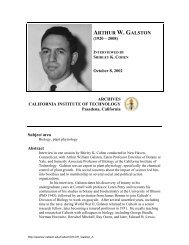Interview with Thomas A. Tombrello - Caltech Oral Histories
Interview with Thomas A. Tombrello - Caltech Oral Histories
Interview with Thomas A. Tombrello - Caltech Oral Histories
Create successful ePaper yourself
Turn your PDF publications into a flip-book with our unique Google optimized e-Paper software.
<strong>Tombrello</strong>–58<br />
You have to figure out which ones go where. You have to sort of figure out what the<br />
personalities are. How do you put each one of them <strong>with</strong> the right person, where the personality<br />
will not be jarring? They vary in their ability to deal <strong>with</strong> the undefined. Remember, they’re<br />
very young, they’re all teenaged. So the first term, pretty much, we work on toy problems. I get<br />
used to listening to them; then I sort of parcel them out.<br />
ASPATURIAN: What’s a toy problem?<br />
TOMBRELLO: Ah. A problem you find in science—something where you can see if they can<br />
make any progress in a couple of weeks. Not some big research thing, but “Why don’t you look<br />
at this?” Sometimes they turn into real problems. Dave [David J.] Stevenson [Goldberger<br />
Professor of Planetary Science] has been part of the course for maybe the last ten, twelve years,<br />
and he will take a couple of students and be part of the weekly tutorials when he’s in town.<br />
That’s been a big help. Dave’s a gifted teacher. He’s a brilliant scientist. It’s good for the kids<br />
to work for him. Some of the kids he’s had have done extremely well and published nice papers<br />
<strong>with</strong> him. I could do it <strong>with</strong>out Dave, but it wouldn’t be as much fun.<br />
ASPATURIAN: Whom else have you had, in terms of teaching faculty?<br />
TOMBRELLO: None. The students are parceled out to different professors for these research<br />
projects I mentioned. Kimble’s had one. Zewail’s [Ahmed Zewail, Pauling Professor of<br />
Chemistry and professor of physics] had a couple. Rob [Robert B.] Phillips [Morris Professor of<br />
Biophysics and Biology] had one. How much attention they get all depends on group dynamics.<br />
LIGO’s had one. But you see one of my former research undergrads was Ken Libbrecht, who<br />
sort of runs the student thing for LIGO, and Ken is a true believer. He’ll always buy one if I<br />
need him. [Axel] Scherer [Neches Professor of Electrical Engineering, Applied Physics, and<br />
Physics], of course, has done absolutely better than everybody else at taking a student and<br />
getting something just so unexpected and so brilliant. I remember Brian D’Urso [BS 1998] when<br />
he was a freshman. He was working on a problem of how you model photonic chips. This had<br />
defeated just about everybody except a professor at MIT <strong>with</strong> a supercomputer. But Brian, I<br />
think, figured it out <strong>with</strong> a Mac, a laptop. I remember Amnon Yariv came in. He was waiting to<br />
talk to Scherer, and he met Brian. Brian was a freshman. And it was so funny; I wish I had a<br />
http://resolver.caltech.edu/<strong>Caltech</strong>OH:OH_<strong>Tombrello</strong>_T

















